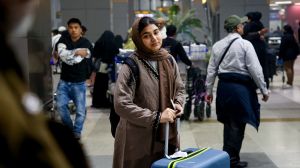Call It Babel
28 leading global writers introduce lesser known ones.

Words without borders wordswithoutborders.org is an international project that aims to promote literature in translation. Its first anthology, Literature from the 8220;Axis of Evil8221;: Writing from Iran, Iraq, North Korea, and Other Enemy Nations, brought together fiction and poetry from seven countries including Iran, Iraq, and North Korea, some of these works being translated into English for the first time. This new anthology, called The World Through the Eyes of Writers, brings together the works of twenty-eight writers from across the world.
Each has been recommended and briefly introduced by another, more well-known writer. Some of these introductions, full of courtesy and love, the introductions are themselves little works of art. Ahdaf Soueif introduces Palestinian writer Hassan Khader along with her own translation of his essay 8220;Shards of Reality and Glass8221;. Introducing Hunan-based writer Can Xue, Ha Jin adds that though he does not share most of her literary views, he admires her conviction. Introducing Gamal al-Ghitani as 8220;the most important Arab novelist today8221;, Naguib Mahfouz adds that he is 8220;part of my autobiography8221;.
No, there is no story listed under 8220;India8221; as such in this collection; there is, however, because these words are without borders, a superb short story by Bengali writer Parashuram Rajshekhar Basu, whose country is listed as Bangladesh. 8220;The Scripture Read Backward8221;, a sharply funny take on the colonial story, is translated by Sukanto Chaudhuri and introduced by Amit Chaudhuri, who writes: 8220;Our longings, if they came true, would be the stuff of comic dystopia.8221; India features in another way in the extract from Giorgio Manganelli8217;s 8220;Experiment with India8221;, a musical four-page paragraph that begins in the temple town of Madurai and ends with a lament for the lost art of 8220;making our dreams solid8221;.
Many of the stories are about travel. Goli Taraghi8217;s narrator takes a chaotic Iran Air flight from Paris to Tehran and sees someone from her past, someone who symbolized the need to win at any cost. Ma Jian8217;s 8220;Where Are You Running To?8221; is the story of a chase that leads into the changing marketplace, through the streets and 8212; where a young girl lies on a handcart, dying of bone cancer, unable to pay for her chemotherapy, outside the gates of the hospital 8212; into the past.
In his introduction to the anthology, Andre Dubus III points to the ironical figures that necessitate efforts like this volume: 8220;50 per cent of all the books in translation now published worldwide are translated from English, but only 6 per cent are translated into English.8221; Ignorance about other cultures contributes to conflict, even war. Not only writers themselves but also their works are sometimes caught in such conflicts. It is a sign of our times that one of the writers featured in this volume was born in a refugee camp; another was a member of the Bosnian army; another had his work banned in his home country; yet another left his country to avoid persecution by the State. Hassan Khader was able to return to Palestine only after an exile of twenty years and, Ahdaf Soueif tells us, once sent his proofs to the printers in an ambulance.
But the stories here go beyond war and politics to a better understanding of ourselves, and that, as Dubus points out, is the real task of the writer: 8220;These are the voices we have forgotten in languages we no longer speak or never did. Whether we know it or not, these are the notes in the world symphony in which we all play a part8230; This is our duty, yes, but it is also a deeply moving pleasure, one that will allow us, ultimately, to become more gracefully and truly ourselves.8221;
- 01
- 02
- 03
- 04
- 05































